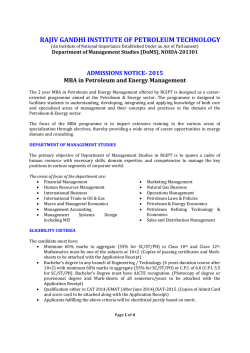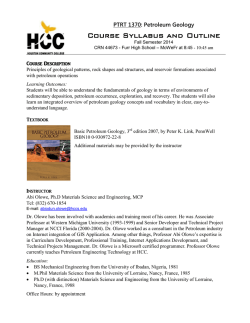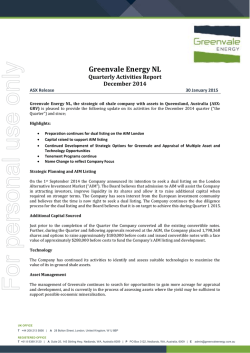
Official Statement Mobile, AL January 29, 2015
Official Statement Mobile, AL January 29, 2015 Energy is vital to Mobile, to Alabama, and to the Southeast. Access to reliable, affordable energy is critical to manufacturing, to job creation, and to the millions of individual consumers who call this region home. That belief is the core of our mission and it is the reason we are here today. Now in its seventh year, the Partnership for Affordable Clean Energy is a coalition of organizations that believe smart energy policy is key to making our communities stronger. Our members include Manufacture Alabama, the Alabama AFL-CIO, the Alabama Agribusiness Council, the Business Council of Alabama, Southeast Cotton Growers, the Tennessee Mining Association, and many others. It is a diverse group that shares a common belief that our economic future is closely tied to our energy future. That is the foundation of our advocacy and our work from Arizona to Florida and beyond, and with utilities and consumers of all kinds and sizes. In June of this past year, PACE together with its partner, the Consumer Energy Alliance, held the first-ever Gulf Coast Energy Forum right here in Mobile. The purpose was to bring together energy leaders and stakeholders from Mississippi, Alabama, and Florida to discuss common opportunities and challenges in the energy sector. Our speakers and panelists included Mayor Stimpson, Rep. Bradley Byrne, Florida Energy Director Patrick Sheehan, and five executives from the region’s largest power providers. A key takeaway was that the growth of the region depends heavily on what happens in Mobile. We will hear today from residents of Mobile, but I am not one of those. However, what Mobile decides about its above ground storage tank industry affects those far beyond this city. Nearly 150,000 Alabamians work in jobs related to the port and sea terminals. The above ground petroleum storage tank industry that has operated safely in Mobile for eight decades provides feedstock for refineries in the region. There are four refineries, both in Alabama and Mississippi, that depend on petroleum storage tanks in Mobile. I have personally toured the refinery in Tuscaloosa. These refineries account for a tenth of U.S. refining capacity. In short, this is no small matter. In fact, it is a matter of energy security and national security. It goes without saying that the implications are tremendous for Mobile, as well. A quarter of Mobile’s GDP is from the energy sector. A substantial portion of this comes from the above ground petroleum storage tank industry, which employs more than 5,000 people in Mobile County. While local leaders should always keep the concerns of the port’s neighbors in mind, maintaining the vitality of the above ground petroleum storage tank industry is key to keeping Mobile’s port competitive and growing. Investors will spend nearly a trillion dollars updating our nation’s oil and gas infrastructure in the next ten years. Keeping Mobile and this region competitive means freeing vital industries from overly burdensome restrictions, and local leaders have an opportunity to do just that. Local leaders also have an important opportunity to pave the way for affordable and stable energy rates. Although the issue at hand does not directly affect utilities, the atmosphere created by regulation sends an important signal about other infrastructure issues such as natural gas pipelines. It is clear that the U.S. must build more pipelines to both meet future energy demand and to upgrade existing natural gas corridors. Two summers ago, PACE intervened in a series of hearings held by the Alabama Public Service Commission. These were meetings demanded by activist groups who believed that energy rates are too high. In the first set of hearings, which focused on Mobile Gas, it became clear that a significant part of the rate structure governing natural gas rates paid by consumers is related to energy infrastructure. The lesson I took away is that strong energy infrastructure in the long term leads to more stable and affordable natural gas rates. I suspect that the same activist groups who cried foul over Mobile Gas’s rates are also now opposing the construction of energy infrastructure in the city. The truth is, however, that more energy infrastructure is good for Mobile. It is good for consumers. It is good for the economy of the region. That is true for an above ground petroleum storage tank or any other project that improves energy supply. We are here today to support the growth of energy in Mobile and to oppose restrictions that seem to us unnecessarily cumbersome. On behalf of our members, we hope you will make the right decision.
© Copyright 2026











